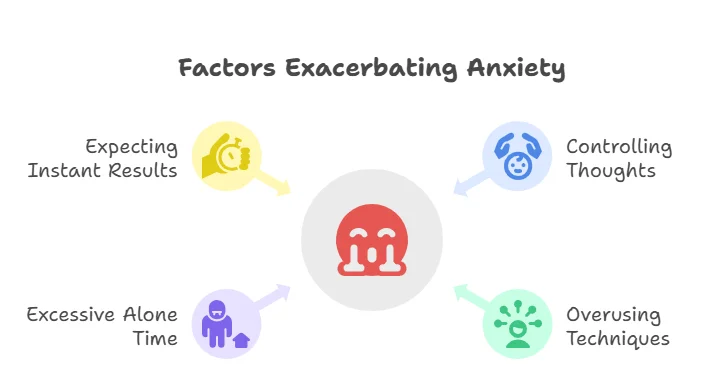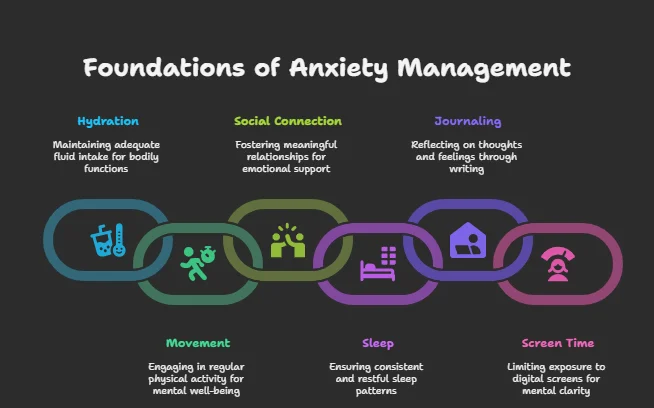Why Does Anxiety Disorder Get Worse Before It Gets Better?
By ViaClari Voice | Updated on 3 June, 2025

Does Anxiety Get Worse Before It Gets Better? 🤔
Yes, and Here’s Why That’s More Common Than You Think
If you’re working on your anxiety, maybe through therapy, medication, or self-help, and it suddenly feels worse, not better, you’re not alone. This is a common stage in recovery, and while it can feel discouraging, it’s often a sign that things are moving in the right direction.
In fact, many people experience a temporary spike in anxiety symptoms, like racing thoughts, shortness of breath, or intense restlessness, just as they begin making real changes. Two members from Viaclari Voices shared what that phase felt like for them:
When I first started therapy for anxiety, I didn’t expect to feel worse. A member of the Viaclari editorial team shared: ‘It felt like my thoughts got louder before they got quieter. But that was the first time I realised I’d been bottling them up for years.
Another contributor reflected: ‘In the beginning, just naming my fears out loud made me feel more anxious, like I was giving them power. But over time, I saw that saying them out loud actually took their power away.
These reflections highlight an essential truth: the discomfort you feel early on may actually mean you’re doing the hard but necessary work of healing. So if you’re thinking, “Why am I feeling more anxious now that I’m trying to manage it?” …keep reading. That’s exactly what we’re here to unpack.
Why Anxiety Sometimes Gets Worse Before It Gets Better 🧠
When you begin addressing anxiety, whether through cognitive behavioural therapy, medication, or simply becoming more self-aware, you’re likely confronting thoughts and feelings you’ve been avoiding. That shift can feel overwhelming at first.
Here are some of the reasons why it happens:
1. You’re Paying More Attention to Your Inner World
Therapy and mindfulness teach you to observe your thoughts. But early on, this can backfire a bit. Suddenly, you’re noticing just how much you overthink, worry, or catastrophise. It’s not that the anxiety is worse; it’s that you’re more aware of it. And that awareness can feel… intense.
2. You’re Facing Fears Instead of Avoiding Them
Exposure, whether structured (like in CBT) or incidental, is a core part of treating anxiety. But facing something scary, even in small steps, can trigger a temporary increase in anxiety levels. This doesn’t mean the strategy is wrong. It’s how the brain learns that what it fears might not actually be dangerous.
📌 Pro tip: If you’re working with a mental health professional, they’ll guide you through this safely.
3. Medication Side Effects
Some people who start antidepressants or anti-anxiety meds (like SSRIs) experience a brief spike in anxiety during the first few weeks. This is a well-documented side effect. Fortunately, it usually fades as your body adjusts.
⚠️ Important: Always speak to your GP or psychiatrist before stopping or adjusting medication.
4. Triggers and Lifestyle Factors That Worsen Anxiety🚨
Some anxiety triggers are obvious. Others are sneaky. Here are common factors that increase anxiety:
- Too much caffeine or alcohol
- Poor sleep (even one bad night can spike anxiety symptoms)
- Scrolling late at night (yes, doomscrolling counts)
- Skipping meals or extreme dieting
- Isolation (spending too much alone time can increase anxious thoughts)
- Unrealistic expectations or perfectionism
What Actually Makes Anxiety Worse Even When You’re Trying to Get Better 😩

Now here’s the twist: sometimes our efforts to control anxiety actually end up fueling it instead. Let’s look at how that happens and how to avoid these common traps.
1. Trying to Control Every Anxious Thought
One of the most counterproductive things we do is try to think our way out of anxiety. Thoughts like “I shouldn’t feel this way” or “I have to calm down right now” only add pressure, which, in turn, increases anxiety.
💡 Try this instead: Acknowledge the thought without reacting to it. You don’t have to believe everything your mind says.
2. Overusing Coping Techniques (Yes, Even Deep Breathing)
Breathing exercises are wonderful, but only when used correctly. Obsessively checking if you’re “doing it right” or using deep breathing as a panic shield can actually make your anxiety worse.
✔️ Use it to calm your body, not to erase anxiety entirely.
3. Too Much Alone Time
Recovery can feel exhausting, but withdrawing from social contact often amplifies anxious thoughts. Isolation leaves too much space for rumination, which causes anxiety to spiral.
💡 Spending time with people (even virtually) can help take your mind off negative loops and reconnect you with reality.
4. Expecting Instant Results
Anxiety recovery takes time. But when we expect to feel better immediately, every spike can feel like a setback. In reality, progress often looks messy.
Think of it like physical rehab after an injury; some discomfort is part of healing.
Triggering Mistakes People Make While Recovering from Anxiety ❌
Even with the best intentions, some behaviours can unintentionally cause more anxiety. Let’s look at the most common anxiety mistakes people make during recovery and how to avoid falling into these traps.
1. Avoiding Triggers Instead of Facing Them Gradually
It’s tempting to avoid the things that trigger anxiety, whether that’s social situations, driving, or even going to the supermarket. But avoidance reinforces the message that these things are dangerous, which keeps the anxiety cycle going. 🚫
👉 The better approach? Gradual exposure. Face your fears in small, manageable steps. This helps train your brain to stop reacting with panic.
2. Expecting Therapy or Medication to “Cure” Anxiety Overnight
Yes, anxiety is treatable. But healing doesn’t come from a single session or a miracle pill. It’s a process that unfolds gradually. Many people give up too early when their anxiety doesn’t vanish within a few weeks.
🧠 Stick with it. Anxiety recovery is more like building muscle than flipping a switch.
3. Over-Googling Physical Symptoms
When anxiety flares up, you might experience physical symptoms, such as a racing heart, shortness of breath, and dizziness. These sensations are real but not usually dangerous. Still, a quick search for “chest tightness” might convince you you’re having a heart attack.
💡 This is known as health anxiety, and Googling can fuel it fast.
👉 Instead of obsessively researching, acknowledge the symptom, ground yourself, and use calming techniques.
4. Believing a Bad Day Means You’re “Back to Square One”
Progress isn’t a straight line. You can have a great week and then suddenly feel awful, and that doesn’t mean you’ve failed.
🧠 Think of anxiety recovery like weather patterns: the clouds may return, but that doesn’t mean the sun isn’t still shining above.
5. Neglecting Physical Health or Sleep 😴
Your body and mind are deeply connected. If you’re skipping meals, sleeping poorly, or overworking yourself, your body will interpret this as a threat. It’ll respond with… anxiety.
Researchers found that a single night of sleep deprivation amplifies amygdala and insula responses to threat cues, especially in people with higher trait anxiety, explaining why poor sleep can make anxious thoughts feel louder the next day.
Taking care of your physical health isn’t optional. It’s foundational.
How to Support Yourself When Anxiety Feels Worse

When you’re in the thick of it, knowing what actually helps can make all the difference. Here are tried-and-tested ways to feel less anxious and regain a sense of calm, even on hard days.
1. Gentle Goal Setting 🎯
Setting tiny, realistic goals each day builds momentum. That could mean making one phone call, taking a walk, or just getting out of bed and showering.
✅ These wins send signals to your brain that you’re capable, and they slowly boost your resilience.
2. Use Relaxation Techniques (Wisely) 🧘
Try tools like:
- Progressive muscle relaxation
- Guided meditations
- Soothing music
- Grounding exercises (e.g. 5-4-3-2-1 sensory method)
💡 Don’t use these to escape anxiety; use them to stay grounded while moving through it.
3. Spend Time with Supportive People 👥
Isolation can make your brain spiral. Instead, reach out to someone, even if it’s just a short chat or walk. You don’t need to talk about anxiety if you don’t want to. Just connecting can lift your baseline mood.
4. Know When It’s Time to Seek Help 🧑⚕️
If anxiety is disrupting your life, making it hard to function, or feels like it’s spiralling out of control, it’s time to speak to a professional. That might be a GP, a therapist, or a psychiatrist.
⚠️ Reminder: You’re not weak for asking. You’re strong enough to recognise when support is needed.
💡 There Is a Way Through 💡
You are not your diagnosis.
Depression may shape your days right now, but it doesn’t define who you are or who you can become.
With support, healing is possible. And it begins with understanding your options.
.
How to Manage Anxiety Over Time🛠️
🛡️ Creating an Action Plan for Flare-Ups
Anxiety isn’t something you cure and forget. It’s something you learn how to manage. Having a plan helps you stay grounded when things get tough:
- Recognise the signs early
- Use grounding tools immediately
- Reach out to your support network
- Prioritise sleep, hydration, and food
Remind yourself: This will pass
📊 Tracking Symptoms for Better Management
Anxiety symptoms are your nervous system’s way of communicating. Track them over time:
- What triggers them?
- How long do they last?
- What helped you feel less anxious?
This helps you spot patterns and respond earlier.
🌬️ Deep Breathing Helps Regulate the Nervous System
Anxiety often triggers shallow, rapid breathing, which tricks the brain into thinking something is wrong, even when you’re safe. Deep breathing flips that switch.
When you breathe slowly and deeply, it:
- Signals to your brain that you’re safe
- Lowers cortisol and adrenaline
- Reduces heart rate and blood pressure
- Helps you feel less anxious in moments of distress
Research shows that eight weeks of diaphragmatic breathing sessions significantly reduce salivary cortisol and negative affect, which is why clinicians often prescribe breathwork alongside cognitive-behavioural therapy (CBT).
🧘 Other Grounding and Mindfulness Techniques
Managing anxiety means working with your body, not against it. Alongside deep breathing, try:
- 5-4-3-2-1 grounding (engage your senses)
- Progressive muscle relaxation (release tension, one muscle group at a time)
- Mindful walking (focus on each step, each breath)
- Journaling (helps process anxious thoughts without judgment)
These are not quick fixes, but they are ways to build your ability to cope with stress over time.
Sometimes, even after progress, anxiety seems to spike out of nowhere. Here’s why that happens, and what you can do about it.
🌱 Building Resilience Through Consistent Habits
Long-term recovery means nurturing your nervous system. This looks like:
- Regular movement (walking, yoga, stretching)
- Spending time with people, even when you don’t feel like it
- Creating structure and purpose in your day
- Reducing screen time and information overload
- Practising self-compassion over perfection
You’re not trying to control anxiety 100%, but you’re learning to coexist with it in healthier ways.
Long-term recovery also means pacing yourself. Let’s examine common recovery traps and learn how to stay on course.
Final Takeaway: Anxiety Disorder Recovery Isn’t Always Linear, and That’s Okay 🌅
Anxiety can absolutely feel worse before it gets better. But this isn’t failure, it’s part of the process. Whether it’s therapy, medication, or lifestyle changes, that initial discomfort often signals that you’re finally facing what’s been holding you back.
And healing, while messy, is possible. Anxiety is treatable, manageable, and something millions of people work through every day. You can, too.
🙋♀️ FAQ: Understanding the Ups and Downs of Anxiety Recovery
Can anxiety really get worse before it gets better?
Yes, it’s quite common. When you begin to confront your anxiety through therapy, medication, or lifestyle changes, it can temporarily feel more intense. This doesn’t mean it’s not working; in fact, it often means your brain is beginning to process what it used to avoid
Why does anxiety feel worse even when I’m doing everything right?
Ironically, trying to control your anxiety too strictly can sometimes backfire. Overanalysing thoughts, avoiding feelings, or obsessively using techniques may unintentionally exacerbate them. Recovery requires acceptance, not perfection.
Is it normal to feel anxious during treatment or therapy?
Absolutely. Many people experience anxiety when starting treatment. Becoming more aware of your patterns, facing fears, and challenging beliefs can cause a temporary spike. However, remember that symptoms may increase before they decrease.
What are some common mistakes that people make when managing anxiety?
Some common pitfalls include avoiding triggers, trying to stop all negative thoughts, overusing breathing techniques, or spending too much time alone. These behaviours seem helpful, but can unintentionally increase anxiety or delay progress.
How can I tell if it’s time to seek professional help?
If your anxiety interferes with daily life, causes panic attacks, or feels overwhelming despite your efforts, it’s time to seek professional help. A therapist can help you learn how to manage your anxiety using approaches that are used to treat many types of anxiety disorders.
Can anxiety cause physical problems?
Yes, stress and anxiety often come with physical symptoms like shortness of breath, headaches, digestive issues, and muscle tension. These aren’t imagined; they’re real bodily responses to emotional stress.
Is there a way to control anxiety long-term?
While there’s no one-size-fits-all cure for anxiety, there are many ways to manage it effectively. This includes CBT, medication, relaxation techniques, social support, and building the ability to cope with stress. Many people with anxiety go on to live balanced, fulfilling lives.
What should I avoid doing when I feel anxious?
Try not to suppress your thoughts, isolate yourself, or Google your symptoms excessively. These strategies often make your anxiety worse. Instead, ground yourself, breathe gently, and connect with someone you trust.
Is it possible to prevent future anxiety symptoms?
While you can’t always prevent anxiety, you can help avoid intense flare-ups by maintaining healthy routines, addressing triggers early, and building emotional resilience over time. Knowing what works for you is key.
Are anxiety flare-ups a sign that something is wrong with me?
Not at all. In fact, they’re a normal part of life for many people. Even people who don’t suffer from anxiety may experience stress responses in challenging situations. The difference lies in how we respond and the level of support we have.
